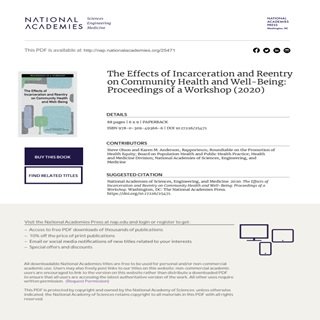By Steve Olson and Karen M. Anderson
The United States is home to 4.4 percent of the world’s population, yet it has 21.3 percent of the world’s individuals experiencing incarceration (Walmsley, 2015). Though the total is down from its peak in 2008, in 2016, 1.5 million people were in prison and 630,000 were in jails—a seven-fold increase since the 1970s. The high rate of incarceration in the United States is a major contributor to the nation’s health inequities. African Americans are more than three times as likely to be incarcerated as whites, and incarceration rates are also elevated for Hispanics, Native Americans, and other population groups compared with the general population. In addition, people who are incarcerated differ from the general U.S. population in terms of poverty levels, geographic origins, gender, and a wide range of health indicators. Health equity, then, intersects with incarceration, reentry, and community health. To examine the connection between incarceration and health inequities, the Roundtable on the Promotion of Health Equity held a workshop on June 6, 2018, titled The Effects of Incarceration and Reentry on Community Health and Well-Being. As part of its commitment to hold workshops in parts of the United States that are particularly affected by the issues being discussed, the roundtable held the workshop at the University of Pennsylvania in Philadelphia, which has one of the highest rates of incarceration of any major American city. It is important to note that the programs and models that are described in this Proceedings of a Workshop are all Philadelphia based, as this is where the workshop took place. As Antonia Villarruel, Margaret Bond Simon Dean of Nursing at the University of Pennsylvania School of Nursing and chair of the roundtable, said in her opening remarks, holding the workshop at the University of Pennsylvania “represents the university’s commitment, as well as the school’s commitment, to working with vulnerable populations, health equity, and social justice.” Winston Wong of Kaiser Permanente also emphasized the place-based nature of the roundtable’s work. “We look at people and we look at communities,” he said. “We look at how individuals who are part of the fabric of our communities are impacted. And we look at assets as much as we look at barriers and obstacles.”
National Academies of Sciences, Engineering, and Medicine. 2020. The Effects of Incarceration and Reentry on Community Health and Well-Being: Proceedings of a Workshop. Washington, DC: The National Academies Press.




